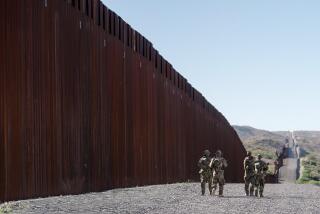OKLAHOMA CITY: AFTER THE BOMB : Individualism Reigns in City Tied to Suspect : Background: Many in Kingman, Ariz., demand the right to be free of government. Paramilitary groups are a common sight in the surrounding desert.
- Share via
KINGMAN, Ariz. — In the town that is the last known address of accused Oklahoma bomber Timothy J. McVeigh, all Sylvia Majeski did was start her own country.
It didn’t amount to much, just a white trailer on a small plot of land on the outskirts of Kingman, but she wanted to make a statement about the government and her utter contempt for it.
“I’m the mayor, the judge, the sheriff, the fire chief and the hangwoman,” she said Tuesday of her country, dubbed The Republic.
Majeski, who once issued a summons to county officials to witness their own hangings, may be an extreme case. But her sentiments about big government are a reflection of how many people feel in this desert community of 29,000 people, where individualism is a valued trait and where paramilitary activity is a common occurrence in the vast surrounding desert.
“It’s attractive to people who want to get away from the government,” said Mojave County Atty. Bill Ekstrom. “Land is cheap. People can buy a piece of land and live by themselves. It’s the tempo for rugged individualists.”
Kingman, located near the western edge of Arizona near the point where it intersects with California and Nevada, has come under intense scrutiny during the past week as word has spread that this is where McVeigh lived since 1993. Federal agents have been scouring the town, searching for any evidence to connect McVeigh with the Oklahoma City bombing. They have been talking to former employers and neighbors and the woman who sorted his mail. And right behind the federal agents have come the reporters from all over the world, searching for their own clues.
Here, in Arizona’s fastest-growing county--one that covers 13,000 square miles--hunters talk of coming across paramilitary exercises in the desert and those in town describe the common sight of seeing men dressed in camouflage driving Jeeps down the street.
A common theme here is the right to be free of government and the right to bear arms, and a lot of them.
“It’s a result of frustration with the government, the taxes and all the other things that go along with it” Ekstrom said.
Walter Mack McCarty, often a critic of Ekstrom and his policies, agrees.
“Every citizen has the right to bear arms and defend themselves,” said McCarty, 72, who said he once taught McVeigh in a defensive handgun class. “I have a .22 pistol, a .38 pistol, a .22 rifle and a .223 rifle and my wife has a shotgun, but that’s just for shooting snakes. People (also) have a right to a certain amount of peace and serenity and not to be bothered by the government. I don’t want the federal government to intrude on my personal life.”
McCarty occasionally pickets Ekstrom’s office because the county attorney decided some time back that guns could not be carried into government buildings.
McCarty said he moved to Arizona from the Ozarks of Arkansas 14 years ago to get away from it all. “I didn’t like the police state that Arkansas was,” he said.
This desert community is a scenic area in the shadow of the Hualapai Mountains that offers both recreation and a family atmosphere. Homes are cheap, with those at the high end going for $70,000. Mobile homes are even cheaper.
It is a town established in the early 1880s by Lewis Kingman, who located the route of the Santa Fe Railroad. And it is the place with the longest remaining stretch of the old Route 66. The actor Andy Devine grew up here, and Clark Gable and Carole Lombard exchanged wedding vows here. Charles Lindbergh once spent the night in Kingman.
But it also a place where small communities of paramilitary groups and survivalists dot the landscape, where they are sometimes found camped out in a remote desert wash.
Jim Shade, a Kingman resident, said he was part of a group hunting deer in the mountains a few years ago when he encountered three menacing-looking men in camouflage outfits. The men told them to turn around and get out.
“We got out of there pretty quick,” he said.
More to Read
Sign up for Essential California
The most important California stories and recommendations in your inbox every morning.
You may occasionally receive promotional content from the Los Angeles Times.










